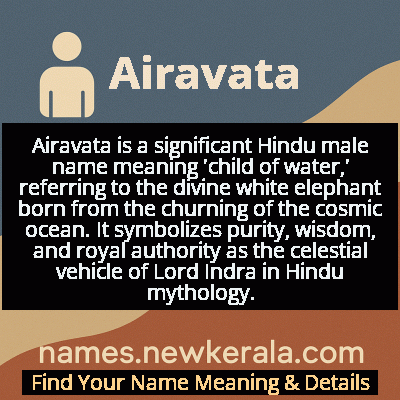Airavata Name Meaning & Details
Origin, Popularity, Numerology Analysis & Name Meaning of Airavata
Discover the origin, meaning, and cultural significance of the name AIRAVATA. Delve into its historical roots and explore the lasting impact it has had on communities and traditions.
Name
Airavata
Gender
Male
Origin
Hindu
Lucky Number
1
Meaning of the Name - Airavata
Airavata is a significant Hindu male name meaning 'child of water,' referring to the divine white elephant born from the churning of the cosmic ocean. It symbolizes purity, wisdom, and royal authority as the celestial vehicle of Lord Indra in Hindu mythology.
Airavata - Complete Numerology Analysis
Your Numerology Number
Based on Pythagorean Numerology System
Ruling Planet
Sun
Positive Nature
Leaders, ambitious, highly driven, self-reliant, innovative.
Negative Traits
Overly aggressive, domineering, impatient, selfish.
Lucky Colours
Red, orange, gold.
Lucky Days
Sunday.
Lucky Stones
Ruby, garnet.
Harmony Numbers
2, 3, 9.
Best Suited Professions
Entrepreneurs, managers, engineers.
What People Like About You
Courage, determination, leadership.
Famous People Named Airavata
Airavata (Mythological)
Divine Elephant
King of elephants, vehicle of Lord Indra, emerged during Samudra Manthan
Airavata (Contemporary)
Spiritual Leader
Modern Hindu spiritual teacher promoting Vedic wisdom globally
Airavata Kumar
Environmental Activist
Founder of water conservation projects inspired by Hindu ecological principles
Name Variations & International Equivalents
Click on blue names to explore their detailed meanings. Gray names with will be available soon.
Cultural & Historical Significance
In Southeast Asian cultures, particularly Thailand, Airavata appears as Erawan, the three-headed elephant that serves as the national symbol and appears on the royal coat of arms. This adaptation demonstrates how the mythological figure transcended Indian borders to become an important cultural icon across Asia. The name continues to be revered in Hindu rituals and temple architecture, where elephant motifs symbolize strength, wisdom, and divine connection. Airavata's story represents the ideal relationship between the divine and the natural world, emphasizing harmony and mutual respect.
Extended Personality Analysis
Individuals named Airavata are often perceived as possessing regal qualities - dignified, wise, and naturally authoritative. They tend to exhibit strong leadership characteristics, combined with a deep sense of responsibility and protection toward others. Their personality often reflects the mythological elephant's attributes: strength tempered with gentleness, intelligence paired with loyalty, and a commanding presence that inspires respect. These individuals typically demonstrate remarkable memory and learning capacity, much like elephants are known for their intelligence.
People with this name often display a calm, steady demeanor even in stressful situations, reflecting the elephant's symbolic association with stability and grounding. They are typically patient, methodical thinkers who consider all aspects before making decisions. Their protective nature makes them excellent guardians of family traditions and cultural values. At the same time, they possess a gentle, compassionate side that endears them to others, creating a balance between authority and approachability. Their strong connection to heritage and tradition often makes them preservers of cultural knowledge and family history.
Modern Usage & Popularity
In contemporary naming practices, Airavata remains a distinctive choice primarily within Hindu communities, particularly among families seeking names with deep mythological significance. While not commonly found in global name databases, it has maintained a steady, though rare, usage pattern in India and among the Hindu diaspora. The name appeals to educated, culturally-aware parents who value both uniqueness and traditional meaning. Recent years have seen a slight increase in usage as part of a broader trend toward reviving classical Sanskrit names. It's occasionally chosen for boys born into families with particular devotion to Lord Indra or those involved in elephant conservation efforts. The name's complexity and distinctive sound make it memorable while its rich cultural background provides meaningful depth.
Symbolic & Spiritual Meanings
Airavata carries profound symbolic weight as the embodiment of celestial power, wisdom, and cosmic order. The white elephant represents purity of intention and spiritual enlightenment, while its association with water and rain clouds symbolizes fertility, abundance, and life-giving energy. In Hindu symbolism, Airavata's four tusks represent mastery over the four directions and the complete understanding of the material world. As the vehicle of Indra, it symbolizes the connection between earthly and divine realms, serving as a bridge between human consciousness and higher spiritual understanding. The elephant's legendary memory symbolizes the importance of learning from past experiences and preserving cultural wisdom. Overall, Airavata represents the ideal balance of power and compassion, authority and service, making it a powerful symbolic representation of enlightened leadership.

